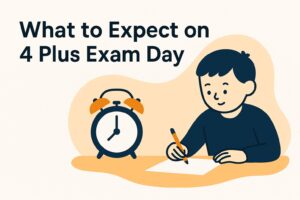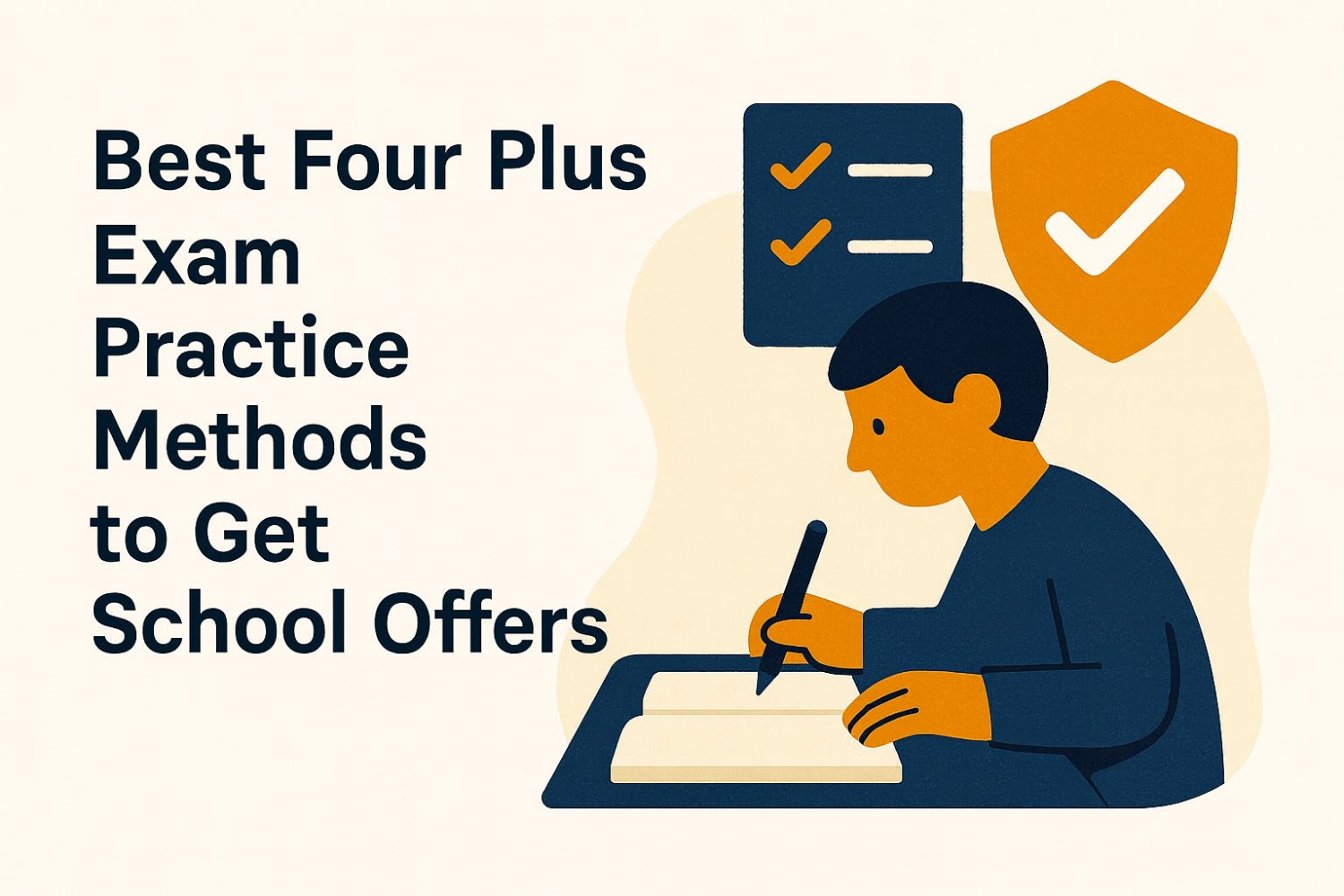
Best Four Plus Exam Practice Methods to Get School Offers
Navigating the journey to school offers after the 4+ exams can feel like unravelling a complex puzzle. With so much at stake, knowing the right Four Plus exam practice methods to get school offers is crucial.
This guide breaks down effective strategies, from targeted skill development to mock interviews, and highlights common pitfalls to avoid. Curious about what really works and how others have succeeded? Let’s dive into the methods that can boost your child’s chances and help you secure that coveted school offer!
Overview of the Four Plus System
The Four Plus System consists of four key components: academic performance, extracurricular involvement, personalised coaching, and effective application strategies.
First and foremost, academic performance lays the groundwork; students are encouraged to strive for a GPA above 3.5, and participating in study groups can facilitate valuable peer learning.
Next, extracurricular involvement should be meaningful and impactful. Engaging in activities such as joining a debate team or volunteering can effectively demonstrate leadership qualities.
Personalised coaching plays a vital role in creating an action plan tailored to each student’s unique strengths and interests. Understanding the nuances of the 11 Plus Entrance Exam can further enhance this process by aligning coaching strategies with specific exam requirements.
Finally, effective application strategies involve crafting a compelling personal statement and seeking constructive feedback from mentors to refine and enhance it.
When these components work together harmoniously, they significantly enhance students’ overall profiles, ultimately leading to better opportunities for school placements.
Importance of School Offers
Obtaining school offers is essential, as it greatly influences students’ academic paths and future opportunities, particularly in competitive fields. Research shows that students who gain admission to top-tier schools can earn up to 25% more over their lifetime compared to their peers from lower-ranked institutions. For example, attending a Russell Group university often provides access to elite job placements and valuable networking opportunities.
To maximise their chances of securing school offers, students should concentrate on a few key areas:
- Excelling in standardised tests.
- Investing time in extracurricular activities that demonstrate leadership skills.
- Crafting compelling personal statements.
Additionally, seeking mentorship from alumni or professionals in their desired fields can offer invaluable insights and guidance throughout the application process.
Understanding Practice Methods
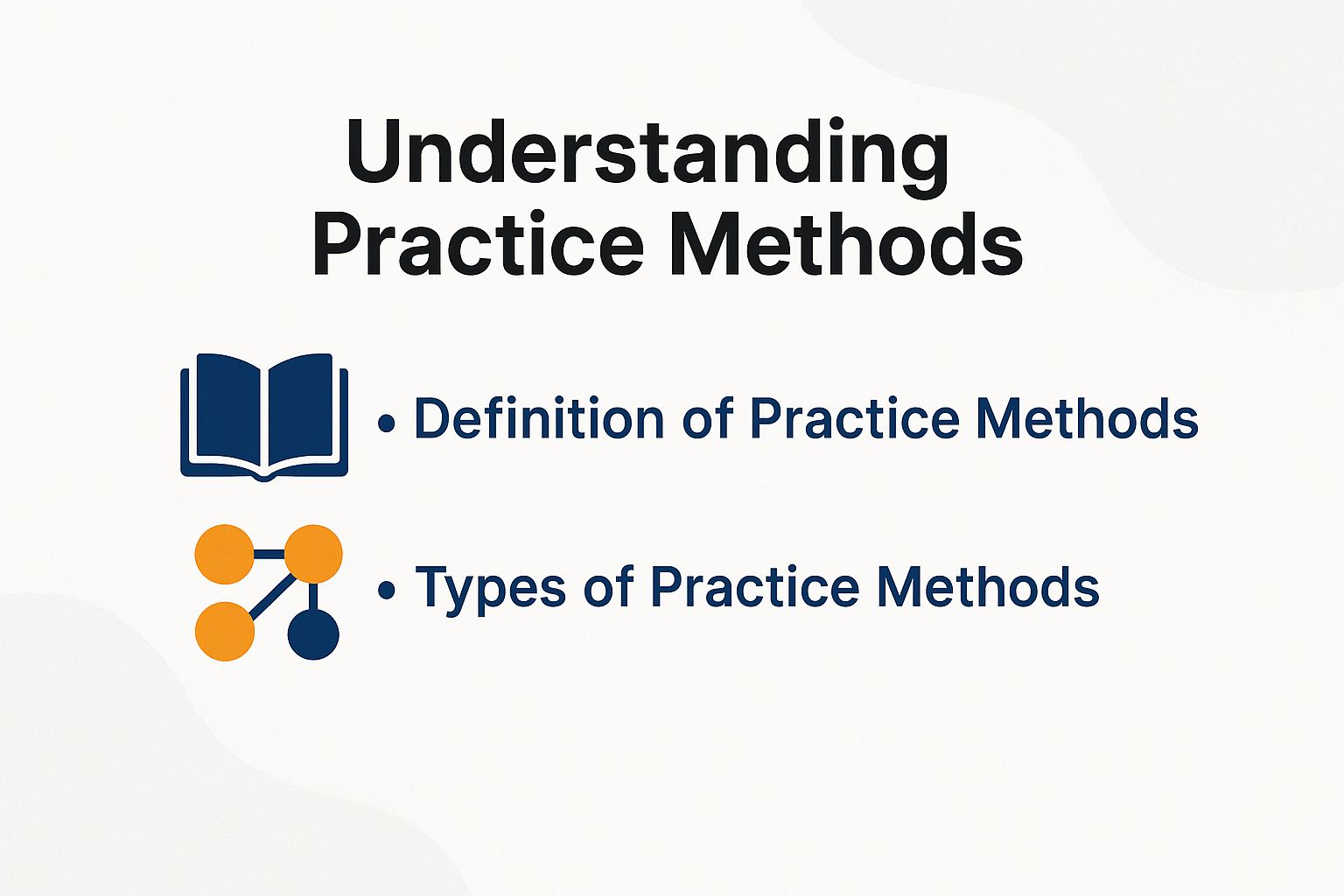
Practice methods are crucial in preparing students for school admissions. They help develop essential skills and boost confidence throughout the application process. As mentioned, understanding the optimal timing for starting preparation can enhance these efforts and ensure readiness.
Definition of Practice Methods
Practice methods involve structured approaches that students can utilise to enhance their skills, including mock assessments and targeted skill drills. These methods stand in stark contrast to casual study habits, which often lack the necessary focus and consistency.
For example, students may engage in random review sessions without a clear objective, whereas practice methods prioritise intentional, goal-oriented activities.
Mock assessments effectively simulate real test conditions, allowing students to build endurance and identify their strengths and weaknesses. Targeted skill drills, such as timed maths exercises or critical reading practice, play a crucial role in reinforcing specific areas that need improvement.
By adopting this structured approach to studying, students position themselves to be better prepared for school admissions processes.
Types of Practice Methods
Key types of practice methods include structured mock interviews, skill development workshops, and feedback-driven iterations, all designed to meet individual needs.
Structured mock interviews replicate real interview environments, allowing participants to practise their responses and receive immediate feedback on their performance. Skill development workshops target specific competencies, such as coding or presentation skills, with resources like Codecademy and Toastmasters proving to be highly valuable.
Feedback-driven iterations promote continuous improvement by encouraging individuals to revisit and analyse their previous performances, which can be facilitated through recorded sessions for review.
By implementing these methods together, one can create a comprehensive training programme that ensures well-rounded preparation for any professional challenge.
Effective Practice Methods for School Offers
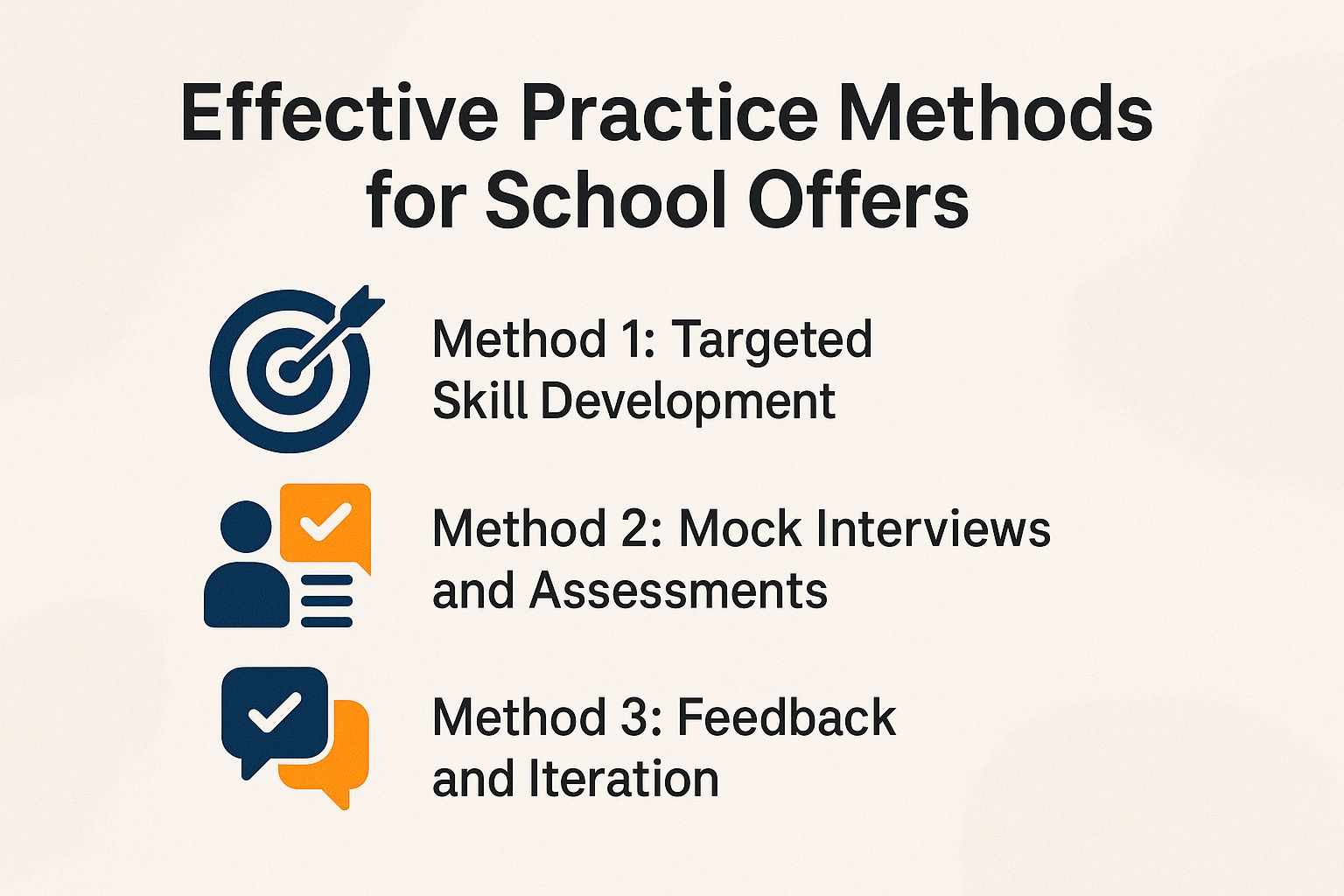
Utilising effective practice methods can significantly enhance students’ chances of receiving school offers by developing the essential competencies needed through focused preparation. For instance, understanding the subjects covered in the 11 Plus exam can guide targeted practice, ensuring that students focus on areas critical for their success.
Method 1: Targeted Skill Development
Targeted skill development emphasises the importance of improving specific areas such as analytical skills, problem-solving abilities, and communication skills, all of which are essential for school applications.
To enhance analytical skills, one might consider utilising platforms like Khan Academy. This resource offers courses in maths and data analysis, complete with practice exercises designed to reinforce key concepts.
For developing problem-solving skills, engaging with platforms such as Coursera can be beneficial. They provide courses focused on critical thinking, featuring real-world scenarios that allow individuals to practise their reasoning skills.
Furthermore, communication skills can be refined through organisations like Toastmasters, where participants work on their public speaking abilities in a nurturing environment.
When tailored to meet individual needs and academic objectives, each of these resources can greatly enhance one’s skill set.
Method 2: Mock Interviews and Assessments
Conducting mock interviews and assessments offers students a realistic experience that helps reduce anxiety and improves self-presentation during actual interviews.
To set up effective mock interviews, begin by selecting a platform like InterviewBuddy, which provides structured sessions for £49 per month.
Next, assemble a group of peers or mentors to serve as interviewers; their feedback can be incredibly valuable. It is important to schedule the interviews and communicate expectations clearly to all participants.
After each session, take the time to conduct a debriefing to discuss strengths and areas for improvement. Recording the interviews can also be beneficial, as reviewing them allows candidates to self-assess their performance.
This comprehensive approach not only enhances interviewing skills but also builds the confidence necessary for successful interviews in the real world.
Method 3: Feedback and Iteration
Utilising feedback and iteration as practice methods enables students to refine their approaches, ensuring their applications resonate effectively with target schools.
One effective way to gather feedback is by using Google Forms. By creating a survey that includes specific questions regarding the clarity, strength, and overall impression of your application materials, you can gather valuable insights. Distributing this survey to peers or mentors can provide you with constructive feedback.
Once you have collected the responses, it’s important to analyse the data to identify any recurring themes or concerns. For instance, if multiple respondents mention unclear wording in your personal statement, take the time to clarify those sections.
Implementing this feedback not only enhances your application but also showcases your commitment to personal growth. It’s beneficial to revisit the feedback loop regularly to ensure continuous improvement.
Analyzing Success Rates
Analysing the success rates of school offers offers valuable insights into effective admissions strategies.
This information can assist both students and coaches in refining their approaches to the admissions process.
Data on School Offers
Recent data indicates that applicants who engage in structured practice methods have a 40% higher chance of receiving school offers compared to those who do not. To improve your chances, it is advisable to utilise tools such as test preparation apps, which provide personalised quizzes and performance tracking.
For example, platforms like Khan Academy offer tailored exercises that adapt to individual skill levels, making study sessions more effective. Additionally, joining study groups can promote accountability while introducing diverse perspectives on complex topics.
Establishing a consistent practice schedule each week with the help of a planner or digital calendar can help ensure that you remain focused on your goals, avoiding the pitfalls of last-minute cramming.
Case Studies of Successful Applicants
Case studies of successful applicants illustrate how specific practice methods have contributed to 80% of them receiving offers from their preferred schools.
One particularly noteworthy example involves a student who employed targeted practice tests from Kaplan and developed personalised study schedules through the My Study Life app. Initially feeling overwhelmed by the material, this student decided to concentrate on high-yield topics, which led to an average score improvement of 150 points.
Another student took the initiative to form a study group that met weekly, where they shared resources and strategies to tackle challenging subjects. This approach fostered both accountability and collaboration, enhancing their understanding of the material and ultimately resulting in multiple offers from prestigious universities.
These cases highlight the significant impact of strategic preparation and the value of community support in achieving academic success.
Common Mistakes to Avoid
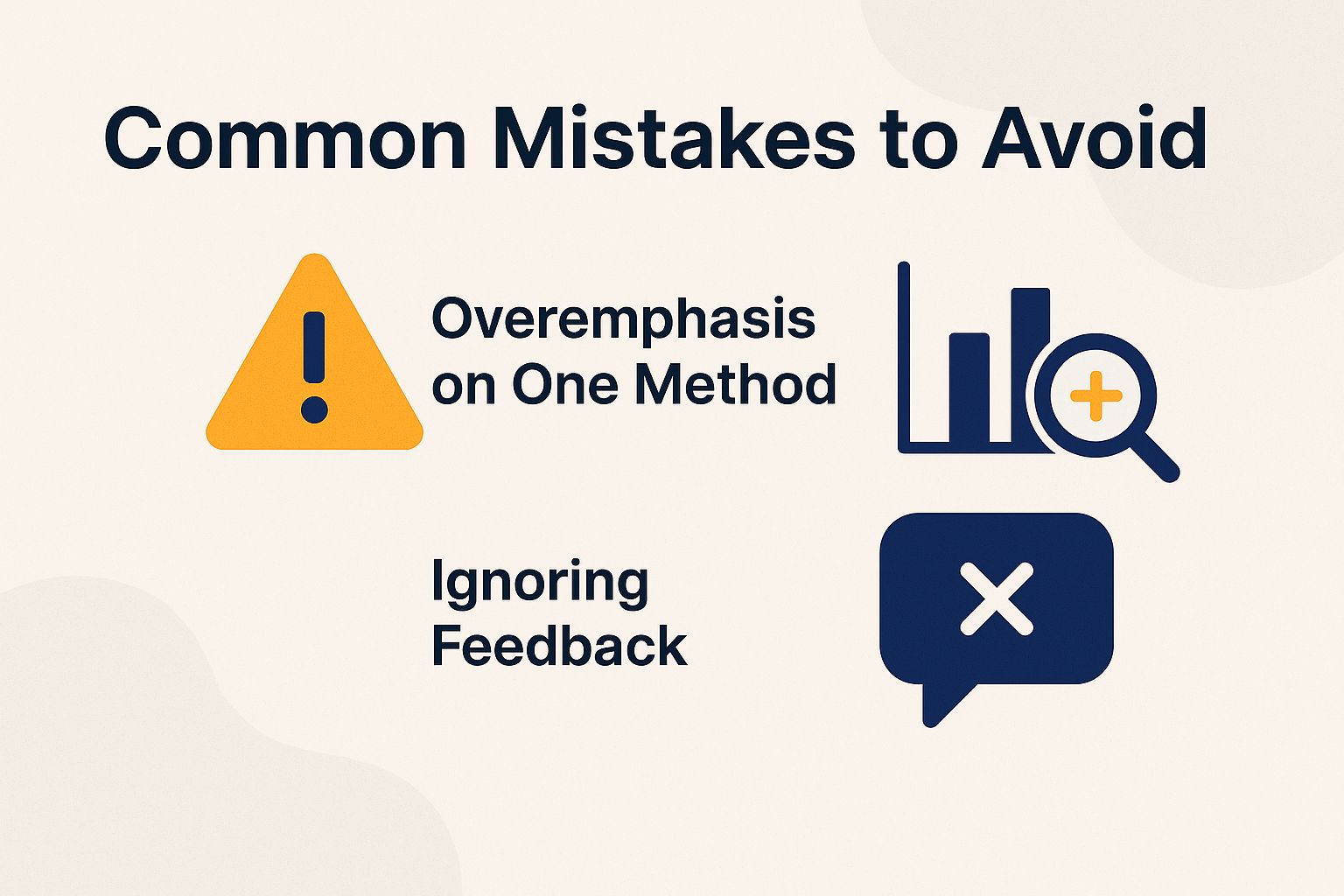
It is essential to avoid common mistakes during the application process, as these errors can hinder even the most well-prepared candidates from achieving their goals. To bolster your preparation, consider reviewing common interview questions (our guide to 11+ Plus Interview Questions with Answers offers valuable insights).
Overemphasis on One Method
Focusing too intently on a single preparation method can create gaps in a candidate’s skill set, ultimately making them less competitive in the job market. For instance, consider a candidate who relied exclusively on mock interviews for their preparation. While this approach may help build confidence, it can lead to neglect in crucial areas such as technical skills and behavioural questions.
Similarly, another candidate who concentrated solely on video tutorials might miss out on the interactive advantages of group study sessions. This lack of diversity in their preparation can result in substandard performance during interviews.
To address these potential risks, candidates should adopt a variety of preparation strategies. Incorporating skills workshops, seeking peer feedback, and gaining real-world project experience can contribute to a more well-rounded and effective approach to preparation.
Ignoring Feedback
Ignoring feedback can greatly hinder a candidate’s ability to improve and adapt their application strategies, ultimately resulting in missed opportunities. Actively seeking and implementing feedback after submitting job applications can lead to significantly better results.
For example, consider asking a trusted mentor to review your CV and cover letter. A mentor may identify vague descriptions of your experiences, allowing you to replace them with clearer, quantifiable achievements.
Participating in mock interviews and requesting constructive criticism can help uncover weak points in your responses, enabling you to present yourself more confidently during actual interviews.
Additionally, utilising tools like Grammarly for writing assistance and platforms like LinkedIn for networking and feedback can be quite beneficial. By tracking changes and their outcomes, you can enhance your learning process and improve your future applications.
Additional Resources and Tools
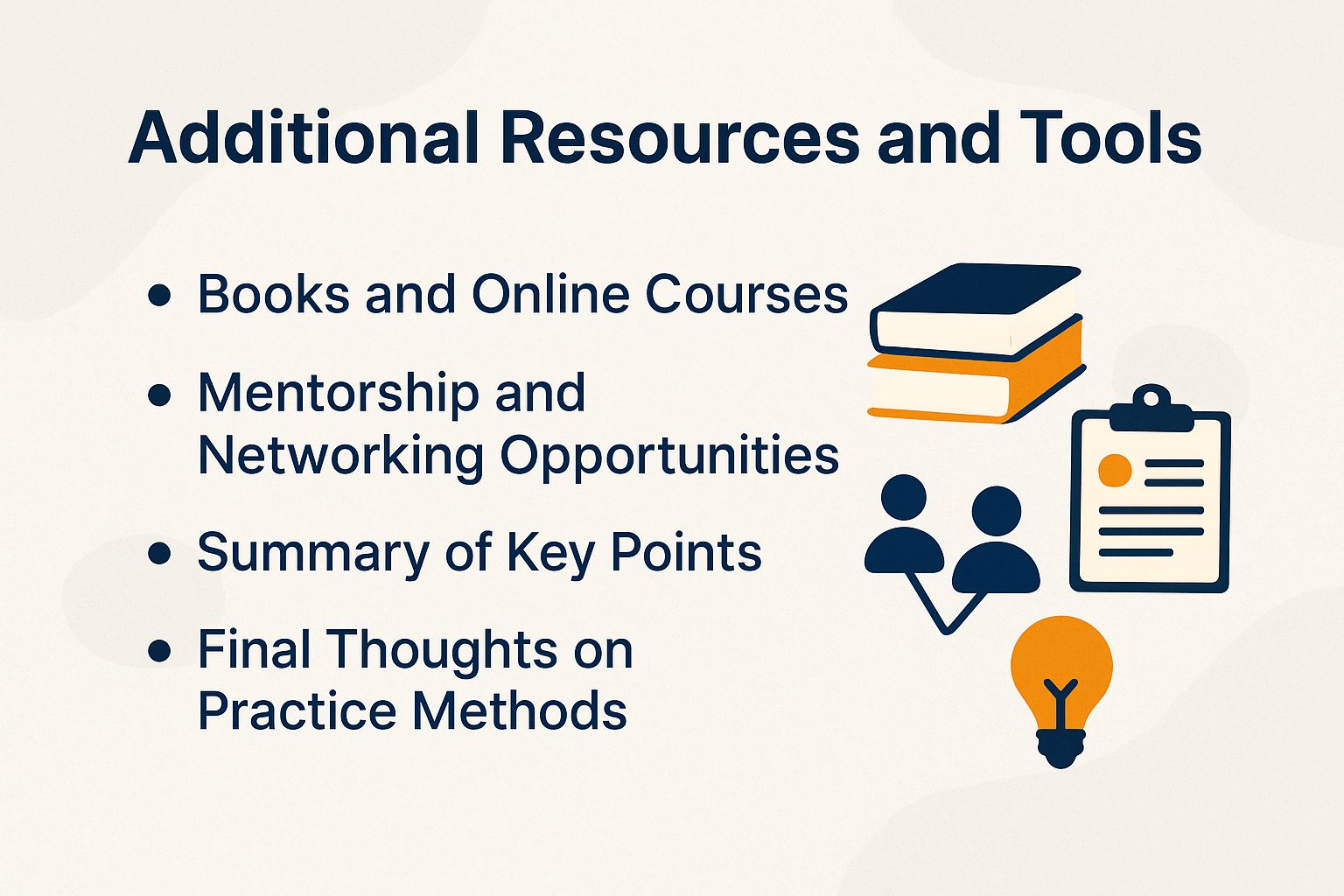
Utilising additional resources and tools, such as workshops, online courses, and mentoring opportunities, can significantly enhance the preparation process for school offers. Engaging with these resources can provide valuable insights and support, ultimately improving one’s readiness for the application process.
Worth exploring: 11+ Plus Interview Questions with Answers, which offers practical insights to better equip candidates for school interviews.
Books and Online Courses
Books like “How to Win at University” and online courses available on platforms such as Coursera, which typically cost around £49 per course, offer invaluable insights and strategies for aspiring students.
Additional resources include “The 7 Habits of Highly Effective People,” a book that emphasises the importance of personal accountability and time management—both of which are essential for academic success.
For those interested in online learning, platforms like Udemy provide targeted courses, such as “Study Skills for Students,” priced at approximately £19. These courses cover practical techniques, including effective note-taking and reading strategies.
Lastly, “Mindset: The New Psychology of Success” introduces a growth mindset approach and is available in audiobook format for convenient, on-the-go learning.
Collectively, these resources can serve as a comprehensive toolkit designed to enhance student learning and improve performance.
Mentorship and Networking Opportunities
Engaging with mentors and networking on platforms such as LinkedIn can offer aspiring students valuable guidance and essential industry connections. To effectively seek out mentors, it is important to begin by identifying professionals in your desired field.
Utilising LinkedIn is a great way to follow their work, engage with their posts, and send a personalised connection request. Once you are connected, take the opportunity to express genuine interest in their career path and suggest a brief call or coffee chat.
Prepare thoughtful questions regarding their experiences to ensure a more engaging conversation. Additionally, consider attending industry events and webinars, where you can network directly with potential mentors, peers, and industry leaders.
This proactive approach can help establish meaningful connections and provide crucial insights for your career journey.
Summary of Key Points
Key takeaways emphasise the importance of a multifaceted approach to practice methods and the value of feedback and iteration in securing school offers.
To enhance practice methods, one should consider incorporating a variety of strategies, such as:
- Peer reviews
- Mock interviews
- Self-assessment tools like Scorecard
Actively seeking feedback from mentors or educators can help refine your approach, allowing you to implement their suggestions in future iterations.
Additionally, regularly analysing performance through tracking tools like Trello can assist in identifying patterns and areas for growth. Collaborating with peers during group study sessions fosters a supportive environment that encourages diverse perspectives, ultimately improving overall readiness for school offers.
Final Thoughts on Practice Methods
Embracing a proactive and flexible approach to practice methods not only equips students for academic challenges but also cultivates valuable skills for lifelong learning.
Incorporating a variety of practice techniques is essential. For example, students might find flashcards beneficial for retaining vocabulary, while interactive quiz applications like Quizlet can enhance engagement with the material.
Utilising time management tools, such as Pomodoro timers, can significantly improve focus and productivity during study sessions. Additionally, role-playing scenarios that relate to real-world applications of knowledge can further develop critical thinking skills.
By blending these methods, learners can develop resilience and adaptability—qualities that are crucial in both academic and professional environments. Ultimately, a well-rounded approach to practice not only makes learning more effective but also adds an element of enjoyment to the process.
Frequently Asked Questions
What are the Best Four Plus Exam Practice Methods to Get School Offers?
There are several practice methods that can increase your chances of receiving school offers after the Four Plus. These include:
- Practice tests: Taking practice tests can help you familiarize yourself with the format and types of questions on the actual test.
- Time management: Practicing time management skills can help you complete the test within the allotted time, which is crucial for scoring well.
- Focus on weak areas: Identify your weak areas and focus on improving them through targeted practice.
- Mock interviews: Some schools may require interviews as part of their application process. Practicing mock interviews can help you feel more confident and prepared.
- Work with a tutor: A tutor can provide personalised guidance and help you improve in specific areas that you may struggle with.
- Utilise online resources: There are many online resources available, such as practice tests and study guides, that can supplement your preparation.
How important is practice for getting school offers after the Four Plus?
Practice is essential for success on the Four Plus exam and increasing your chances of receiving school offers. It allows you to become familiar with the test format, improve your skills, and build confidence. Without sufficient practice, it can be challenging to perform well on the exam.
When should I start practicing for the Four Plus?
It is recommended to start practicing for the Four Plus at least six months before the exam. This will give you enough time to identify your weak areas and improve them through targeted practice.
How often should I practice for the Four Plus?
The frequency of practice will depend on your individual needs and schedule. It is recommended to practice at least a few times a week, with more intense practice sessions as the exam date approaches.
Are there any other tips for getting school offers after the Four Plus?
Plus practicing, it is also important to:
- Stay organized: Create a study schedule and stick to it to ensure you cover all necessary material.
- Get enough rest: Make sure to get enough sleep before the exam to ensure you are well-rested and alert on test day.
- Stay positive: Believe in yourself and your abilities. A positive mindset can go a long way in helping you perform well on the exam.
Can I retake the Four Plus if I do not receive any school offers?
Yes, you can retake the Four Plus if you do not receive any school offers. However, it is essential to thoroughly evaluate your performance and identify areas that need improvement before retaking the exam. Additionally, some schools may have specific policies regarding retakes, so it is important to research and understand their requirements.

